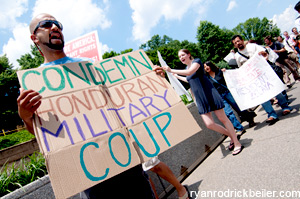 As the situation regarding the military ouster of Honduras' President Manuel Zelaya continues to develop, I Metroed across town to the U.S. State Department to photograph a protest calling for cutting off U.S. aid to Honduras until Zelaya's reinstatement.
As the situation regarding the military ouster of Honduras' President Manuel Zelaya continues to develop, I Metroed across town to the U.S. State Department to photograph a protest calling for cutting off U.S. aid to Honduras until Zelaya's reinstatement.
I'm encouraged that both the United Nations General Assembly and the Organization of American States have unanimously condemned the coup, but it still seems unclear how to peacefully reinstate the democratically elected president of such a deeply divided state. From what I've read since Sunday, it seems that as a populist Zelaya is deeply unpopular with major factions in his own country (and probably not a favorite of our own government) for a variety of reasons, including his relationship with Venezuelan President Hugo Chavez. But it strikes me as similar to the situation in Iran, where from all outward appearances the political figures involved are not clear-cut "good guys and bad guys" (okay, plenty of bad guys to go around), but that what's primarily at stake are core principles of democracy and the rule of law. And the people of both countries have suffered repression and violence when they take to the streets in protest.
This is a reminder to me of the blessing of living in the U.S., where even if a president is deeply unpopular (and apparently Zelaya has Bush-like approval ratings in his home country), at least we don't resort to military overthrow to create regime change. Now if only we were better at encouraging that abroad, given our legacy of actually encouraging coups against democratic governments in the past. Obama's statements regarding the current situation could be stronger, as the White House has stopped short of formally labeling the ouster a "coup" or conditioning U.S. aid on Zelaya's reinstatement. But at least these options are on the table, according to the Washington Post today:
[Secretary General José Miguel] Insulza, of the OAS, is trying to establish contact with people who are not closely allied with either Zelaya or Micheletti to build a compromise, the diplomat said. It was not clear when he would fly to Honduras.
The coup is the first big test for the Obama administration's policy of seeking a more diplomatic and collegial role in a region traditionally dominated by the United States. The military action has been roundly condemned internationally, including by President Obama. But U.S. diplomats have sought to prevent a response that is so tough it leads to bloodshed.
U.S. officials said Wednesday that they would hold off formally designating the Honduran military action a "coup" until Insulza reports back to the OAS on Monday. Such a move is significant, because it would lead to the cutoff of millions of dollars in military and development aid.
Also, it's worth repeating that the military leader of this coup, Gen. Romeo Vasquez, was a graduate of the U.S. Army School of the Americas in Fort Benning, Georgia. Your tax dollars at work. Read Jenn Svetlik's recent post for more details on that. So now the SOA has one more portrait for its Hall of Shame, which includes several other heads of state who took office through military coups.
Ryan Rodrick Beiler is the Web Editor for Sojourners and a photojournalist whose images can be seen at www.ryanrodrickbeiler.com. He traveled to Honduras in 1997 during a semester abroad in Central America, and again in 1998 with a relief team after Hurricane Mitch.
Got something to say about what you're reading? We value your feedback!